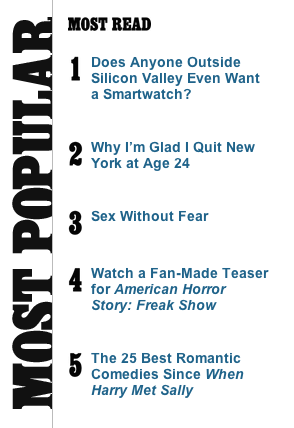 If you look at the list of most popular stories on New York magazine’s front page, you’ll see in the No. 2 slot this piece by Ann Friedman, “Why I’m Glad I Quit New York at Age 24.”
If you look at the list of most popular stories on New York magazine’s front page, you’ll see in the No. 2 slot this piece by Ann Friedman, “Why I’m Glad I Quit New York at Age 24.”
And if you click through, you’ll see that it was published last September.
Why did it resurface? New York pushed it out on Facebook yesterday, as if it were a new story.
And why did it do that?
@jessmisener https://t.co/iGkE9J0evm
— Stefan Becket (@stefanjbecket) July 14, 2014
@jessmisener ~75% of our Facebook followers didn't see it the first time.
— Stefan Becket (@stefanjbecket) July 14, 2014
@jessmisener (i.e., we have a lot more now)
— Stefan Becket (@stefanjbecket) July 14, 2014
New York now has over 950,000 likes on Facebook. And, as publishers are keenly aware, most of your Facebook fans never see what you publish anyway.
Good on New York for finding a new audience for an old piece. But I also want to highlight something useful that the BBC is doing to counteract the impression that years-later bursts of social activity can give — that an old news event is happening right now. As sighted by Meg Pickard, formerly of The Guardian (and a few days earlier by this guy):
Not sure how long this notification's been on BBCNews. Should reduce confusion when old stories surface. Context=good pic.twitter.com/o3KDS0db8e
— Meg Pickard (@megpickard) July 13, 2014
One reason BBC context flag is good: this story comes up fairly regularly, after a flurry of views from blogs/SM etc http://t.co/HkHXnIFRM6
— Meg Pickard (@megpickard) July 13, 2014
(The bra story in question is about Brandi Chastain at the 1999 Women’s World Cup and it was originally posted in April.)
Leaving New York is eternal, and I imagine Chastain’s story will continue to be told for a long time too. In these cases, their newness or oldness isn’t crucial. But that’s not true on all news stories. I’m glad the BBC now has a system for highlighting when a popular news story isn’t necessarily a new one.
One comment:
I like this weblog it’s a master piece! Glad I observed this ohttps://69v.topn google.Raise blog range
Trackbacks:
Leave a comment